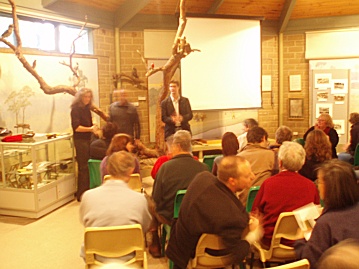Over the past fortnight I attended a number of community focused events, including the 31st Army Cadet Unit, the eastern suburb group of the Order of Australia, which aims to provide a local meeting point for the recipients of this distinguished award.
I also attended a presentation by the Friends of Kolkata, which is a non-profit organisation that coordinates welfare and education projects and volunteer opportunities in partnership with two non-government organisations in Kolkata (Calcutta), India.
All these events highlight in differing ways the ongoing community service that is provided through organisations and by residents of Maroondah.
In addition I also wish to speak on the public launch of the Eastern Transport Coalition (ETC) formerly known as the Eastern Region Integrated Transport Group (ERITG) which occurred last Monday. This launch signifies the beginning of a renewed regional focus towards the advocacy for improved public transport.
In the interests of advancing open discussion, I wish to table the ETC media kit consisting of:
- The launch media release;
- A fact sheet on the group;
- And the advocacy Brochure.
The advocacy brochure in particular outlines key priorities for the region, several of which are relevant for the City of Maroondah:
I quote:
- Upgraded modal interchanges in Ringwood as we continue our push for the redevelopment of Ringwood Station
- An improved bus system which features “increased frequency, route reform and 7 days a week operation”, all of which were identified as high priorities in Maroondah’s Integrated Transport Strategy (MITS) as adopted by this council in February of this year.
While the State Government did recently unveil its Transport and Liveability Statement, dubbed Meeting Our Transport Challenges, with its headline figure of $10.5 billion, it must be remembered that appearing to throw money at an issue does not necessarily solve it.
In particular the plan provides very little for the eastern region, for example rail improvements along the Ringwood line as previously promised in both 1999 and 2002 do not appear at all in this plan.
The issue that ultimately unites the eastern region is the level of bus services, or in our case the lack thereof. Here like in other areas of the plan, the government does provide money for bus services but actually fails to resolve the key issues.
The bus network must be re-designed from to ensure that main roads are provided with a level of service comparable to the train and tram networks.
On first appearance this may seem to be a big ask, but yet our inner city counterparts enjoy a network of tram services that operate on average every 15 minutes through to midnight. As outer suburban residents we are expected to make do with bus services that in four years times, may if we are lucky, operate until 9pm and run every hour.
Families are doing it tough with rising petrol prices eating into budgets and this will ultimately affect our local economy. It is clear that an alternative to car dependence is required and is why the mission statement of the ETC calls for such an alternative.
Accountability is crucial, as otherwise aspects of the plan may not reach fruition. As a recent example the government has still failed to deliver a promised hourly Sunday bus services along Maroondah Highway despite the announcement being made in late 2005.
As part of the region and part of the Eastern Transport Coalition it is imperative that we ensure that the Transport and Liveability Statement is not only implemented but also improved and ultimately accounted for.
